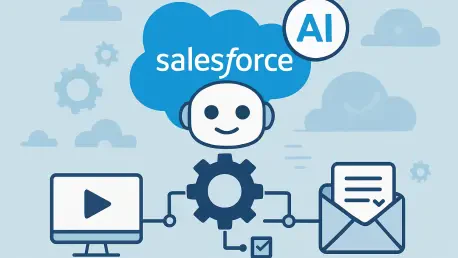In a rapidly evolving landscape of enterprise technology, the convergence of artificial intelligence and process optimization is becoming a cornerstone for businesses aiming to streamline operations and drive efficiency. Salesforce, a leader in customer relationship management solutions, has taken a significant step forward by acquiring Apromore, a process intelligence software provider. Announced just before the annual Dreamforce conference, this strategic move is poised to enhance Salesforce’s Agentforce platform by integrating Apromore’s advanced capabilities in process mining and automation. While financial details of the deal remain undisclosed, the acquisition, expected to finalize in the fourth quarter, underscores a critical industry shift toward embedding deep workflow insights into AI-driven systems. This development promises to address inefficiencies that often hinder automation efforts, setting a new standard for how enterprises approach digital transformation with smarter, data-driven tools.
Strengthening the Core of Agentic AI
Salesforce’s acquisition of Apromore highlights the growing importance of process intelligence as a foundation for agentic AI—systems designed to autonomously execute tasks. Without a clear understanding of existing workflows, automation can inadvertently magnify inefficiencies, leading to costly errors or missed opportunities. Apromore’s expertise lies in providing real-time visibility into business processes across diverse systems, using tools like process mining, digital twins, and root cause analysis. These capabilities allow enterprises to identify high-impact automation opportunities, such as streamlining accounts payable or order-to-cash cycles. By embedding Apromore’s technology into the Agentforce platform, Salesforce aims to ensure that AI agents operate on a solid base of optimized processes, reducing the risk of scaling flawed operations. This synergy is expected to empower businesses with actionable insights, enabling them to refine workflows before automation is applied at scale.
Beyond identifying inefficiencies, Apromore’s system-neutral, no-code approach offers seamless integration with major platforms like SAP, ServiceNow, and Oracle through MuleSoft connectors. This compatibility aligns perfectly with Salesforce’s extensive ecosystem, where many of Apromore’s existing customers already operate. The acquisition builds on a prior investment in Apromore, a company established over a decade ago with significant funding behind it. For Salesforce users, this means enhanced transparency into complex processes and a data-driven method to prioritize automation initiatives with the highest return on investment. Continuous improvement features, such as simulation and compliance monitoring, further ensure that workflows evolve alongside business needs. This strategic integration not only strengthens Salesforce’s offerings but also positions it as a frontrunner in delivering AI solutions grounded in robust process management.
Industry Trends and Competitive Dynamics
The acquisition reflects a broader industry consensus that process intelligence is indispensable for effective AI deployments in enterprise settings. Competitors like ServiceNow, Microsoft, Workday, and UiPath have similarly recognized the need to prioritize workflow expertise within their AI strategies. For instance, ServiceNow has incorporated process mining into its AI workflows, while Microsoft expanded its capabilities through the acquisition of Minit. Workday focuses on optimizing processes in financial and human capital management, and UiPath has transformed into an AI agent orchestration platform with a strong emphasis on automation. This collective movement underscores a shared understanding that without meticulous process management, AI risks producing inaccurate outcomes or automating inefficiencies. Salesforce’s move to acquire Apromore aligns with this trend, reinforcing the necessity of a solid process foundation to achieve meaningful automation results.
Analyst perspectives further validate the strategic importance of this acquisition. Holger Mueller from Constellation Research emphasized that Apromore’s process intelligence graphs provide a reliable framework for ensuring the accuracy of agentic AI, often surpassing traditional data retrieval methods. However, a key challenge lies in how quickly Salesforce can translate Apromore’s tools into actionable features within Agentforce. Execution speed will be critical to maintaining a competitive edge in a market where rivals are rapidly advancing their own AI and process optimization capabilities. The broader implication for enterprises is clear: adopting AI-driven automation without a deep understanding of workflows can lead to suboptimal outcomes. Salesforce’s integration of Apromore’s technology aims to mitigate such risks, offering a pathway to smarter automation that prioritizes precision and continuous improvement across diverse business functions.
Unlocking Future Potential in Automation
Looking back, Salesforce’s acquisition of Apromore marked a pivotal moment in the evolution of enterprise AI, emphasizing the critical role of process intelligence in driving effective automation. By integrating Apromore’s advanced tools, Salesforce fortified its Agentforce platform with capabilities that ensured AI agents operated on optimized workflows, minimizing the risk of amplifying inefficiencies. This move not only enhanced visibility into business processes but also provided a robust framework for targeting high-value automation scenarios, setting a benchmark for the industry at that time.
As enterprises continue to navigate the complexities of digital transformation, the focus should shift toward prioritizing process clarity as a precursor to scaling AI initiatives. Businesses are encouraged to leverage integrated solutions that offer real-time insights and ongoing optimization to stay competitive. Monitoring how Salesforce further develops Apromore’s capabilities within its ecosystem will be essential, as will observing how this influences broader industry standards. The path forward lies in adopting a strategic approach to automation, ensuring that technology serves as a true enabler of efficiency and innovation.









